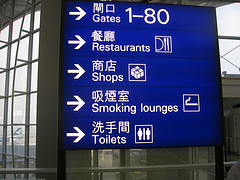 The International Business Series is brought to you by UPS. Discover the new logistics. It levels playing fields and lets you act locally or globally. It’s for the individual entrepreneur, the small business, or the large company. Put the new logistics to work for you.
The International Business Series is brought to you by UPS. Discover the new logistics. It levels playing fields and lets you act locally or globally. It’s for the individual entrepreneur, the small business, or the large company. Put the new logistics to work for you.

The Internet has certainly made expanding into all corners of the world an appealing reality. For very little extra expenditure businesses can set-up a virtual shop in any country within a matter of hours. Attracting and hiring the best talent available on the globe may only be an email away.
For this post I asked two entrepreneurs that have experienced what it takes to do business or enable other businesses to do business globally to share some of the pitfalls and best practices they’ve encountered.
First up is Ryan Carson, founder of UK based Carsonified.
1) Tell us about your current business environment – companies, virtual workforce, markets served, etc
Carsonified hosts conferences for web designers and developers like Future of Web Apps and Future of Web Design in NYC, London, Las Vegas and Miami.
We also run a video training site for web designers and developers called Think Vitamin Membership where members pay an affordable monthly subscription and get unlimited access to our large video training library. Our customers are truly global, spanning all the way from Japan to Russia and everywhere in between.
We’ve got nine people in our office in Bath UK, three in our office in Orlando and one working from home in Greenville South Carolina.
2) What was greatest challenge setting up a company that is both global and virtual?
Dealing with VAT, the sales tax here in the UK. The laws surrounding tax here aren’t written for the Internet age and don’t really make any sense. It was tough getting a straight answer from the tax man about who we needed to charge tax to and how much. Nightmare!
3) What tools do you find you use and benefit from the most in running a global company?
We couldn’t live without Skype and Google Docs. They’re our bread and butter – and they’re free!
4) Are there any best practices you’ve discovered that make running a global company easier?
It’s vital to have Weekly Skype meetings where you see each others faces and have a good catchup.
5) What would you recommend for someone thinking about expanding their business beyond their own borders?
Call your accountant and check tax laws. It’s tough, but once you figure it out, it’s a huge new opportunity to grow your business. Just do it.
Next we turn to Sean Crafts, co-founder of online business collaboration suite MavenLink.
1) How does a tool like MavenLink help companies expand globally?
Mavenlink’s platform makes it easy for businesses looking to secure international talent on an as needed basis and for service providers looking to provide services outside of their native country.
2) Are there any best practices that you’ve witnessed for virtual and global work?
- Visibility – Over-communicate, Keep all key participants informed, see status, review content and track time & expenses against budgets.
- Interactivity – Make it easy to work together, bring all participants together in one workspace with appropriate permissions; allow for as much personal connection as possible in interface, set up in minutes- no IT required
- Accountability – Set the rules – Everything is tied to specific and detailed projects, timelines and budgets. You will always know where you stand and so will your people.
3) What other tools would you recommend to someone wanting to expand globally?
- Google Apps – businesses can run everything from their website to email to calendaring for $50 per user per year.
- Skype or Google Voice – The quickest way to avoid $50 phone calls I’ve come across. Widely adopted and used internationally, you can easily add video conferencing capabilities for free.
- PayPal – Rather than having to establish complex cross border banking ties, let PayPal handle the heavy lifting for the price of a standard credit card transaction fee.
- Google Translate – great if you are communicating with someone in a project workspace, via email, or via chat.
4) What are some potential pitfalls?
- Time Zone challenges – Having a workspace where you can work “asynchronously” but still stay on the same page minimizes the impact of non-overlapping schedules.
- Relationship Building – Working remotely requires a new type of relationship building. I’ve seen teams work together for 10 years and never meet, but still find a way to have tremendous relationships. It requires you to take advantage of technology though to stay connected, even on non-work related matters. Connecting with your business colleagues through Facebook/Twitter, and taking advantage of free real time communication whenever possible allows you to stay close while being remote.
5) Any thoughts on getting started in the global arena?
Like any other expansion, take your first steps with the help of your existing, trusted relationships. Someone you know will know someone that can help you get started. From there, build outwardly from the core once you understand the potential opportunities, have a clear set of objectives, and a confidence in your ability to execute. Depending on the scope of your expansion, consider using local (U.S. based) consultants to help guide you. You will be able to quickly find resources with expertise by region and by industry.
?

